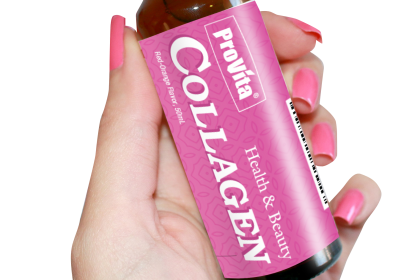
Seventy percent of our skin is made from collagen. Within the skin, collagen is the main component of the dermis: the layer that gives our skin elasticity and flexibility. Beginning at age 21, our body’s production of new collagen begins to decline and existing collagen begins to break down. By the time we are around 60 years old, we have half as much collagen as we did at the age of twenty-one. In addition, collagen synthesis rates – our body’s ability to create new collagen – have dropped by 75%1. Exposure to UV rays throughout our lifetime furthers this depletion, which leads to wrinkles, dryness, and saggy skin. Research shows oral collagen protein supplementation can help aging by firming and hydrating skin and removing deep wrinkles. Additionally, collagen helps aging by protecting against UV-induced skin damage. Learn about all the collagen anti-aging benefits below.
Collagen increases skin elasticity and hydration
Many clinical trials have shown collagen protein supplementation increases skin elasticity and hydrates skin. In one trial, women aged 35 and over showed statistically significant improvement in skin elasticity and skin hydration among subjects given 2.5 or 5 g of collagen daily for 8 weeks 2. In another study among women ages 40 to 60, supplementation with collagen for eight weeks helped with anti-aging as it showed a 28% average increase in skin moisture levels, and 91% of subjects reported less dry skin after supplementation3.
Collagen suppresses UV-induced skin damage and photoaging
Research has found a positive effect of collagen peptide ingestion on reducing skin damage associated with sun exposure. Repeated UV exposure has been linked to aging effects on the skin, including wrinkle formation, decreased hydration, and decreased skin-collagen content. In a study measuring skin changes in subjects who were repeatedly exposed to UV damage for 6 weeks, the subjects who were given collagen peptides throughout the trial demonstrated fewer effects of sun damage compared to the control group4. Another study showed a 31% decrease in skin-collagen fragmentation after supplementation for 12 weeks3.
Collagen decreases wrinkle depth and volume
Another study measuring the effect of collagen intake on skin wrinkles showed a statistically significant reduction of eye wrinkle volume in comparison to the placebo group after 4 and 8 weeks of daily collagen intake5.
Collagen hides cellulite and eliminates stretch marks
By strengthening the dermis layer of our skin, collagen also plays an important role in hiding cellulite and removing stretch marks. Cellulite becomes more visible as our skin stretches, thins, and sags. By increasing skin-collagen expression and improving skin elasticity and thickness, collagen helps to generate stronger, thicker skin that eliminates stretch marks and hides fat beneath the skin.
Oral intake of collagen improves skin more than topical creams
While collagen is used in many skin creams and lotions, it unfortunately does not get absorbed by the skin when applied topically. Topical collagen usually contains full-length collagen protein molecules, which are too big to penetrate the skin. Oral collagen peptides are shorter-chain protein segments that are readily absorbed into the bloodstream and utilized by the skin. In order to reap the full benefits of collagen, it must be ingested in peptide form to promote synthesis of new collagen fibers in the skin. Research supports the direct relationship between oral collagen peptide ingestion and skin collagen content. In a study measuring the effect of collagen hydrolysate intake on expression of collagen in the skin, oral administration of collagen peptides for four weeks almost doubled the amount of collagen produced by skin fibroblasts6.
UV exposure causes collagen fragmentation
Collagen breakdown is a chronic part of our aging process – as our cells age, their ability to produce collagen diminishes. Scientists have determined that 50% of our collagen decline is due to this chronic aging, but another 30% of this loss is due to photoaging: breakdown of collagen by UV exposure. Scientists have linked UV exposure to an increase in collagen-degrading enzymes in our skin. Once collagen molecules have been fragmented, the ability of skin cells to synthesize new collagen slows, creating an irreversible decrease in collagen production and total collagen content over time1.
Collagen degradation may lead to skin cancer
Research suggests that degenerated or damaged collagen may play a significant role in the formation of precancerous and cancerous skin cells. Degeneration of skin collagen caused by skin diseases, UV radiation, and injury leads to the development of “pseudoelastic tissue,” which has been found to be a precursor to cancer7.
Review of Collagen Benefits for the Skin and Anti-aging
– Collagen increases skin hydration and elasticity
– Collagen helps to reduce skin damage caused by the sun, which is linked to aging effects, including wrinkles and reduced skin hydration
– Collagen supplementation can help to reduce wrinkle depth and volume
– Collagen supplementation helps to hide cellulite and strength marks by strengthening the dermis layer of our skin
– Oral collagen peptides are absorbed into the bloodstream, making them more effective than topical collagen skin creams that do not get absorbed by the skin
– UV exposure has been shown to cause photoaging, breakdown of collagen
– Damaged or degenerated collagen can play a role in the formation of precancerous or cancerous skin cells




Hi, this is a comment.
To get started with moderating, editing, and deleting comments, please visit the Comments screen in the dashboard.
Commenter avatars come from Gravatar.